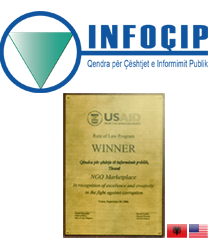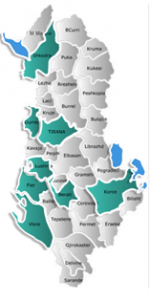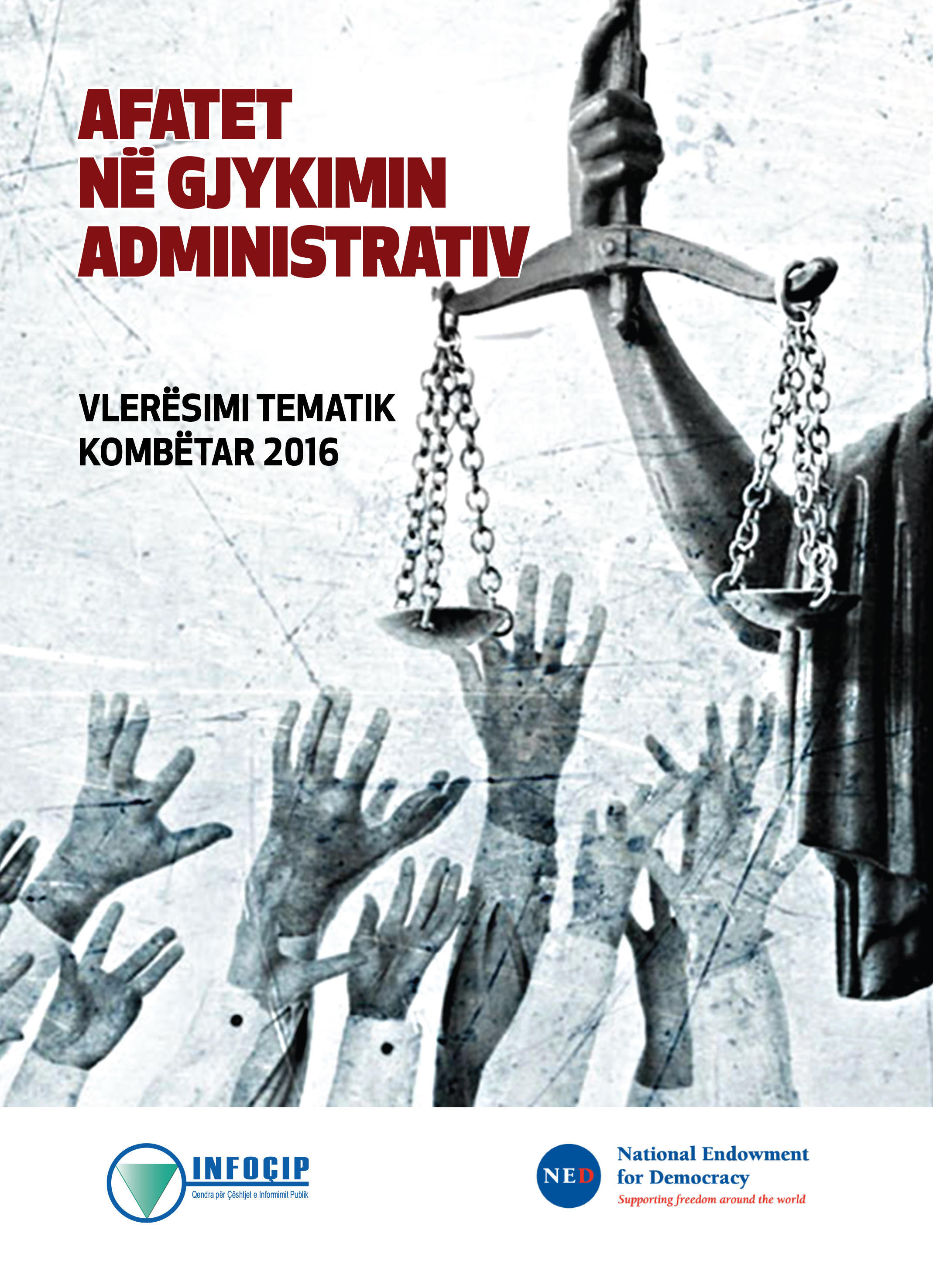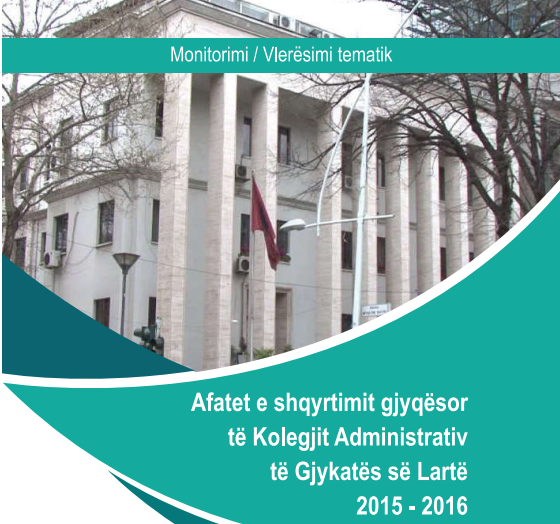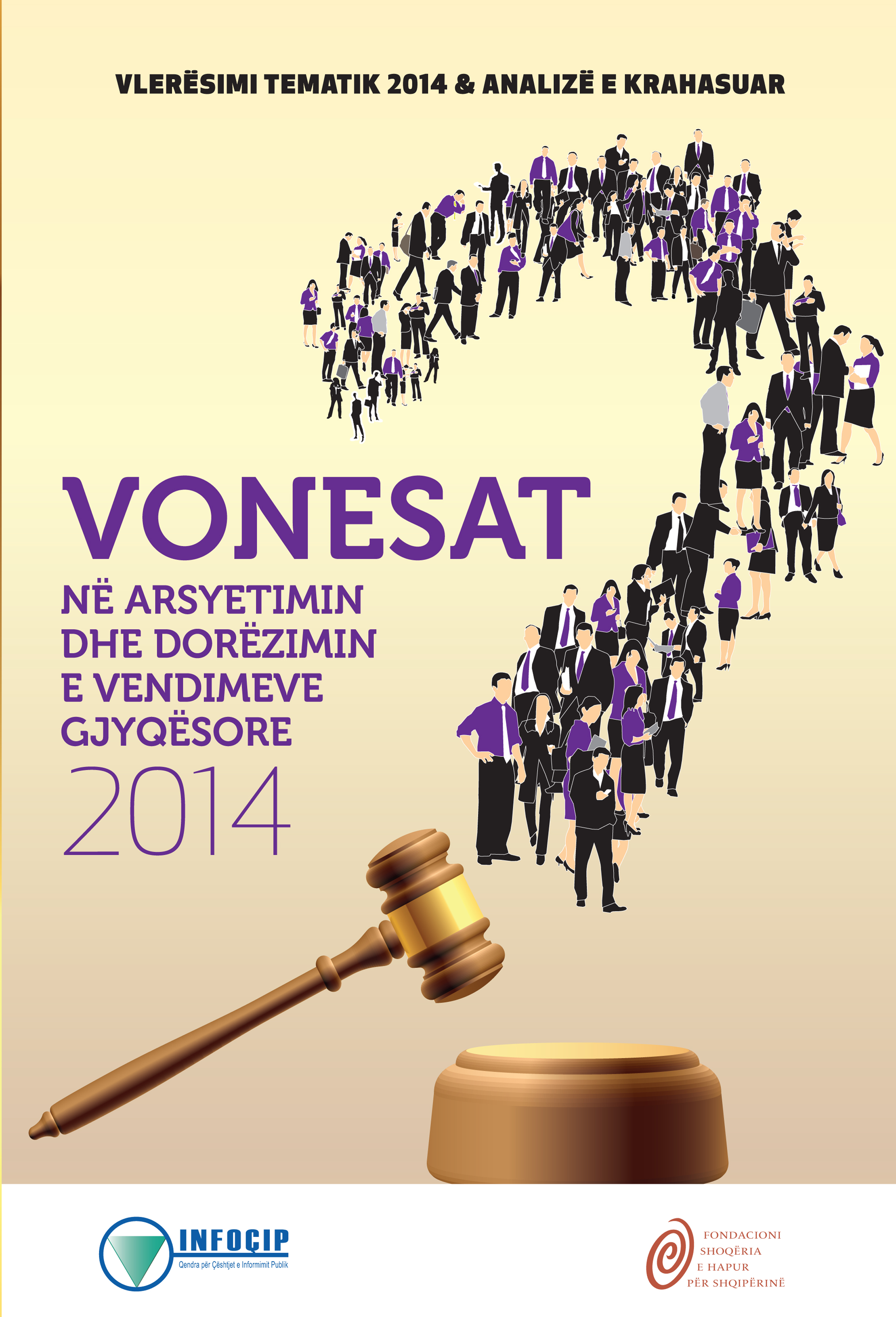It takes 20 years to “pay off” debt. INFOCIP announces findings of 5-year study for Supreme Court
The Supreme Court is the pinnacle of judicial power in the Republic of Albania. After the adoption of the Constitution, it operated on the basis of organic law 8588, dt. 15.3.2000 [1], organized in two colleges, Criminal and Civil. In 2013 it was added to the Administrative College. In total, the Supreme Court consisted of 19 members. In the framework of the Justice Reform, the organic law of the High Court was repealed by Law 98/2016 “On the Judicial Organization of the Republic of Albania”. This law does not specify what the number of judges in the High Court should be and this is considered a shortcoming of the legislative process. Currently, the Supreme Court has only one judge, unable to make decisions. Its final decision was made on April 30, 2019. The last judge was dismissed from the vetting in July 2019, and it was precisely President Xhezair Zaganjori. There is also (not yet) a decision of the new judicial bodies as to what the number of Supreme Court judges should be. (download Executive Summary)
In 2015, INFOÇIP began measuring the duration of trials in the Supreme Court in partnership with the National Endowment for Democracy, NED, based in Washington, D.C., supported largely by the US Congress. The 5-year thematic evaluation analyzes the timing of judicial review of recourses as well as the time for reasoning of decisions made at the hearing. Decisions in the chamber on the admissibility of recourse are not subject to evaluation. This represents the first and only thematic assessment of the Supreme Court covering the time before and after the Justice Reform. (download full edition in PDF)
1.LOADING & PERFORMANCE
In the last 5 years, the Supreme Court has rendered 4054 final decisions. The Administrative College alone made more decisions than the other two colleges made together. From January 1, 2015 until April 30, 2019, he awarded 2368 recourses. During the same period, the Civil College made 1042 decisions, while the Criminal College made 644 decisions at the hearing. In 2019, due to the removal of the judging panel as a result of the veto, the Administrative College managed to issue only 12 decisions (the last one being 30 April 2019). Meanwhile, the Criminal and Civil College made their final decisions on June 30, 2018.
For the period 2015-2019, the Supreme Court has rendered on average about 1000 decisions a year (de-facto only 4 years, ie without 2019). The best indicators are in 2015, with 1462 recourses decided by this court. This does not include decisions taken in a counseling room or decisions of another nature (calculations, extraditions, etc.).
2. DURATION & DELAYS
Based on the 5-year indicators analyzed by INFOÇIP until the Supreme Court no longer ruled, it turns out that Albanian citizens waited an average of 867 days or 2.4 years to make a recourse decision from the Administrative College, 812 days or 2.2 years from the Civil College. and 459 days or 1.2 years from the Criminal College (from the moment of recourse registration until the decision is made at the hearing).
Meanwhile, to complete a final decision with full legal reasoning, the Administrative College needed an average of 41.7 days, the Civil College 35.8 days, and the Criminal College 65 days.
In the last 5 years, the recipe with the most extreme duration is the one with the no. register 6, no. act 195, for which the Civil College took 2935 days, or 8 years to reach a decision. Meanwhile, the most delayed decision in the reasoning results with no. 51, dt. 14/6/2018 for which it took the Civil College 322 days to conclude. In the study being released today, INFOÇIP listed the 30 issues with the most extreme duration for each year and for each college. Meanwhile, all Thematic Evaluation checklists can be opened directly in Open Data format at the National Platform www.gjykataehapur.al, at: https://www.gjykataehapur.al/1210-2/
3.TRIALING WITHIN A REASONABLE TIME
The lawmaker has prescribed in Law 98/2016 “On the Organization of the Judicial Power in the Republic of Albania”, the deadlines for a reasonable judgment at all three levels of judgment (Article 399/2) [2]. In the High Court, the reasonable time limit for a civil trial is 2 years; for the criminal trial of crimes 1 year, and for criminal offenses is 6 months. The Assembly has not set a deadline for reasonable administrative judgment in the third instance. For the purposes of evaluation, the prescribed term for civil judgment may be applied by analogy (INFOÇIP consideration).
For the Civil College it results that out of the 1042 recourses reviewed in the last 5 years by him, 873 or 83% of the total go beyond the reasonable time limit [3]. This calculation does not add to the time consumed to make the reasoning of the decision, which is an integral part of the calculation of a reasonable time under ECtHR jurisprudence.
In terms of criminal recourses, the 5-year monitoring concludes that out of 644 recourses analyzed, 353 of them, or about 55%, were judged beyond a reasonable time limit (the study does not differentiate criminal offenses from criminal offenses, but applies same legal maximum term / contrast to both categories, ie 1 year).
The Administrative College has delivered about 2368 final decisions in the session in 5 years. Of these, 1611 or 68% of them are given a reasonable 2-year term.
4.FORECASTS FOR BACKLOG
Currently, the Supreme Court is awaiting trial for about 30 thousand files (28863 by the end of 2018). INFOÇIP estimates that if the Supreme Court were to be supplemented by a new 19-member judicial panel and colleges start work on a regular basis to make decisions on the pending recourse, it would take about 20 years, if we calculate efficiency to the 2015 average. (the best of the last 5 years).
INFOCIP estimates that in order to “process” this backlog in just 10 years, the judiciary would have to make final decisions on about 3000 recourses a year. Limited to the 280 work days that the calendar year has, about 10-11 recipes per work day (about 3-4 recipes per College per day) would have to be decided. To achieve this judgment efficiency, no recourse should be accepted in the meantime for these 10 years. This is a dramatic record of the work awaits new members of the Supreme Court.
On a hypothetical calculation, if the Supreme Court were required to evacuate its backlog in just one year (without accepting any recourse until the full stockpile evacuation was complete), 107 decisions would have to be given final every working day (for 280 working days that year). Each college would have to make 36 decisions in a single business day.
To cope with such volumes, the Supreme Court would have to have a judicial body with at least twice its members and three times the legal aid. If the LJ will have the same judicial body as it had, with 19 members, with two advisers each, it is destined to drag on due process inevitably due to the backlog it inherits. Consequently, one of the premises of the Justice Reform, which was to eliminate the delay in litigation, risks remaining an unrealizable objective in the High Court.
5. VETTING & EFFICIENCY
The vetting process negatively affected the efficiency of the High Court. In 2015, before the Justice Reform, the Administrative College reviewed and adjudicated 710 recourses. Meanwhile, in 2019, only 12 administrative recourses, “0” civil recourses and “0” criminal recourses were decided.
On the other hand, the vetting process exposed to the public serious problems of the integrity of this court’s judiciary. The most flagrant case was that of Judge Admir Thanza, who had concealed to the Albanian authorities the fact that an Italian court had sentenced him in 1999 to a final verdict (with 40 days in prison and 100,000 fine sentences). His criminal conviction in Italy was revealed by IOM representatives. A Tirana court found former judge A. Thanza guilty and sentenced him to 9 months in prison, converted to 18 months probation. The verdict was rendered on March 31, 2018 while the prosecution had sought his sentence of 1.6 years in prison.
Earlier, another member of the Supreme Court, Ms. Majlinda Andrea was involved in bribing a property decision. The scandal also badly damaged the Supreme Court’s reputation. The latter, by criminal decision no. 8/25, dated 14.06.2017 found the defendant Majlinda Andrea guilty of the criminal offense of “passive corruption of judges, prosecutors and other officials of the judiciary”.
The presence of such persons in the Supreme Court’s judicial body is undoubtedly a dramatic scandal. Such circumstances have fully legitimized the fierce eagerness of the entire judiciary of the High Court, which ended in July 2019 with the removal of Supreme Court President Xhezair Zaganjori. Trust in the Supreme Court has taken a heavy hit.
However, INFOÇIP considers that not filling vacancies in the Supreme Court is a shortcoming of the Justice Reform. The inability of the new judicial bodies, but also of the senior decision-making institutions to manage the deep crisis that the Supreme Court’s vetting process has exposed, is an indicator that does not speak in favor of careful planning. Albanian lawmakers should have foreseen a “contingency plan” for such an unprecedented situation. The new judicial bodies should take over the situation without delay and without further justification, beginning with the decision on the organic.
The emptying of the Supreme Court by the judiciary has produced a difficult moment not only for the parties that have filed recourses, but also for the entire judicial system as a whole, which is no longer oriented through unified practice. As a naming body, the already vacant Supreme Court has paralyzed the decision making of the Constitutional Court body.
The Supreme Court of the Republic of Albania inherited the highest stock (backlog) of any analogue court in Europe, with over 30,000 files. The vast majority of them are administrative recourses, with state institutions being the defendants. About 60% of these recourses relate to social security, military pensions and layoffs. As to the latter, it turns out that the Supreme Court has issued interim rulings suspending the execution of the appeal decision, where the State has been a losing party. This is considered a negative, even unconstitutional, practice that has denied justice to citizens who have won the Appeal. Moreover, it risks significantly increasing the costs that may be charged to Albanian taxpayers in a second time in terms of reparations if the recourse is won by individuals when the Supreme Court resumes work. (A calculation of actual costs is available in the publication for the Administrative College [4] only.)
The upward trend for the Supreme Court became very sensitive in 2018, with a total of 217 decisions rendered, about 1,300 less than 2015 when the Reform had not yet begun. In 2019 only 12 decisions were taken by April. The recourses awaiting review have thus been added to the 2 year delay, this time not because of the problematic efficiency of the High Court, but because of the Justice Reform and the filling of vacancies. The Supreme Court must be replenished with an additional judicial body urgently!
[1] “On the organization and functioning of the Supreme Court of the Republic of Albania”, as amended by Law no. 151/2013, Amended by Law no. 177/2014, Enacted by Law 98/2016 “On the Judicial Organization of the Republic of Albania”.
[2] Article 399/2 “Reasonable Deadline”, Added by Law no. 38/2017, dated 30.3.2017
[3] For 2015, the term in question cannot be applied as a legal contrast.


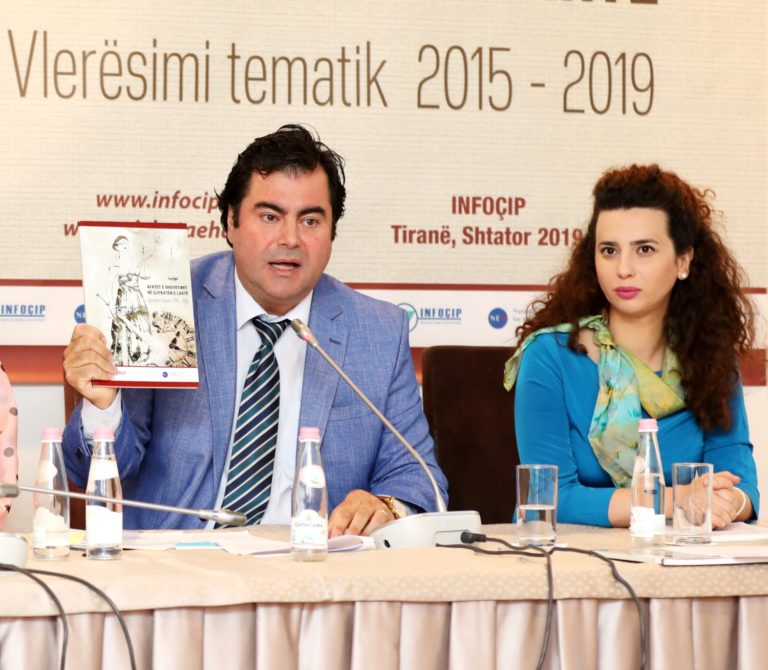
LAST RELEASED PUBLICATION
MONITORING REPORT
Recent reports/studies
Partners / Donors
Local Branches
- Citizens' Transparency Office, Durrës (19)
- Citizens' Transparency Office, Korça (9)
- Election Situation Chamber (11)
- JUDICIARY (1)
- NED (11)
- www.vendime.al (5)
Foto lajm

- CPII anounces the monitoring result for Durres Municipal Council. It must be re-elected
Where we work

